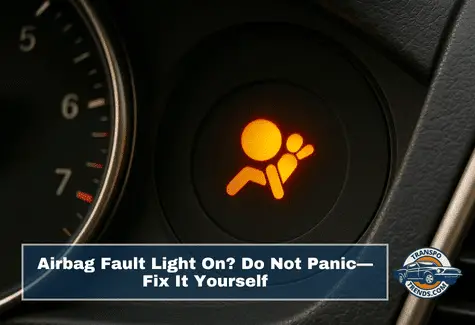It is a small light, but it brings big fear.
You start your car, and there it is—a bright red or amber airbag warning light staring back from your dashboard. It might flash. It might stay on. Either way, it raises a question every driver dreads:
Is my airbag going to work in a crash—or not at all?
If your airbag fault light comes on, it means there is a potential issue in the Supplemental Restraint System (SRS), which includes airbags and sometimes seatbelt tensioners. It is not just a warning—it is a life safety issue.
Many people rush to the dealer, expecting hundreds—or even thousands—of dollars in diagnostic fees and replacement costs. But sometimes, the fix is shockingly simple, and it does not cost you anything.
Let us walk through what the airbag fault light means, when to stop driving, and how to clear it yourself with one basic tool.
What Is the Airbag Fault Light?
The airbag fault light, also known as the SRS light, is a dashboard symbol that looks like a person sitting with a circle in front of them. This circle represents the airbag.
When this light appears and stays on after the car starts, it means that the car’s computer has detected a malfunction in one or more parts of the airbag system. Common reasons include:
- Disconnected or loose seatbelt sensors
- Faulty crash sensors
- Low voltage from the car’s battery
- Corrupted sensor data during startup
- Airbag module fault
Out of all these, one of the most common triggers is a low-voltage signal during startup—especially if your car battery is weak or you recently jump-started the car.
This is where the simple fix comes in.
When Should You Stop the Car?
The airbag light does not mean your airbag is about to explode. But it does mean your airbag may not deploy during a collision. That is serious.
If the light comes on while you are already driving, do not slam on the brakes or stop in traffic. Find a safe place to pull over and evaluate your situation.
- If you are on your way to a repair shop or have access to tools, follow the steps below.
- If you were recently jump-started, replaced a fuse, or changed your battery, this reset may be all you need.
Otherwise, always consult a certified technician.
The Zero-Dollar Airbag Light Fix
If your airbag fault light was triggered by a temporary low voltage or a minor electronic glitch, this fix can reset your car’s onboard computer and clear the light.
You will need:
- A wrench that fits your battery terminal bolts (typically 10mm)
- Access to your car battery in the engine bay
- Five minutes of your time
Step-by-Step Instructions
Step 1: Open the Hood and Locate the Battery
Most car batteries are in the front engine compartment, though some are in the trunk or under a seat in certain models. Look for a rectangular black box with two thick cables attached.
- The red terminal is positive (+)
- The black terminal is negative (−)
Important: Always work with the negative terminal first to avoid sparks or short circuits.
Step 2: Loosen the Negative Terminal
- Use your wrench to loosen the nut on the negative terminal.
- Do not remove the nut completely—just enough to slip the connector off the post.
- Lift the cable off the battery post and move it aside. Do not let it touch metal.
Step 3: Wait for Five to Ten Seconds
This brief waiting period allows any residual voltage in the system to drain. It resets your car’s airbag module and electronic memory, similar to rebooting a computer.
Step 4: Reconnect the Terminal
- Place the connector back onto the negative terminal.
- Tighten the nut securely with the wrench to ensure proper contact.
Make sure the connection is solid—loose terminals can cause voltage issues that trigger dashboard faults.
Step 5: Start the Car and Check the Light
Now, get into your car, close the door, and start the engine.
- If the airbag light stays off, the reset was successful.
- If the light comes back on, there may be a deeper issue requiring diagnostics.
Tip: Always make sure the driver’s seatbelt is clicked in before starting the engine, as loose sensors can trigger false warnings.
Why This Method Works
This fix does not erase deep computer codes or override serious errors. What it does is clear temporary sensor or voltage-related glitches.
Many car sensors—including airbag modules—are sensitive to voltage drops. A failing or low battery, or even a poor start on a cold morning, can send incomplete signals to the airbag system.
Disconnecting the battery resets the control module, allowing it to check all components again under normal voltage.
It is not a trick. It is a manufacturer-recommended first step in many service manuals.
When This Fix Will Not Work
There are times when the airbag light will not go away using this method. For instance:
- If the airbag module itself is damaged
- If a crash sensor or seatbelt pre-tensioner is faulty
- If an airbag has previously deployed and was not reset
- If wiring has been chewed or corroded
In these cases, you will need an OBD-II diagnostic tool to read the fault codes, or professional inspection at a service center.
Can You Drive With the Airbag Light On?
Yes, your vehicle will still run and drive with the SRS light on. However:
- Your airbag system may not work in an accident.
- Some insurance companies may reduce payout if airbags were disabled and not repaired.
- In many regions, your vehicle will fail safety inspections with the airbag light illuminated.
Your airbag system is not just for you—it protects your passengers too. Always treat this warning with care.
Cost of Professional Repair
If the reset does not work and the light remains on, diagnostics and repair may include:
| Repair Type | Estimated Cost (USD) |
|---|---|
| Airbag sensor replacement | $250 – $600 |
| SRS control module reset | $100 – $300 |
| Seatbelt tensioner replacement | $150 – $500 |
| Full airbag module replacement | $1000+ |
Always start with the simplest fix. If this zero-cost method works, you just saved yourself a visit and several hundred dollars.
Summary
| Step | Action | Purpose |
|---|---|---|
| Locate Battery | Find red (+) and black (−) terminals | Identify the correct side to disconnect |
| Loosen Negative Terminal | Use wrench to loosen and lift the black cable | Prevent power to the airbag module |
| Wait 5–10 Seconds | Let voltage drain from system | Reset the onboard airbag memory |
| Reconnect and Tighten | Attach terminal and tighten securely | Restore full electrical contact |
| Start Engine | Turn on the car and observe the airbag light | Verify if the reset cleared the warning |

